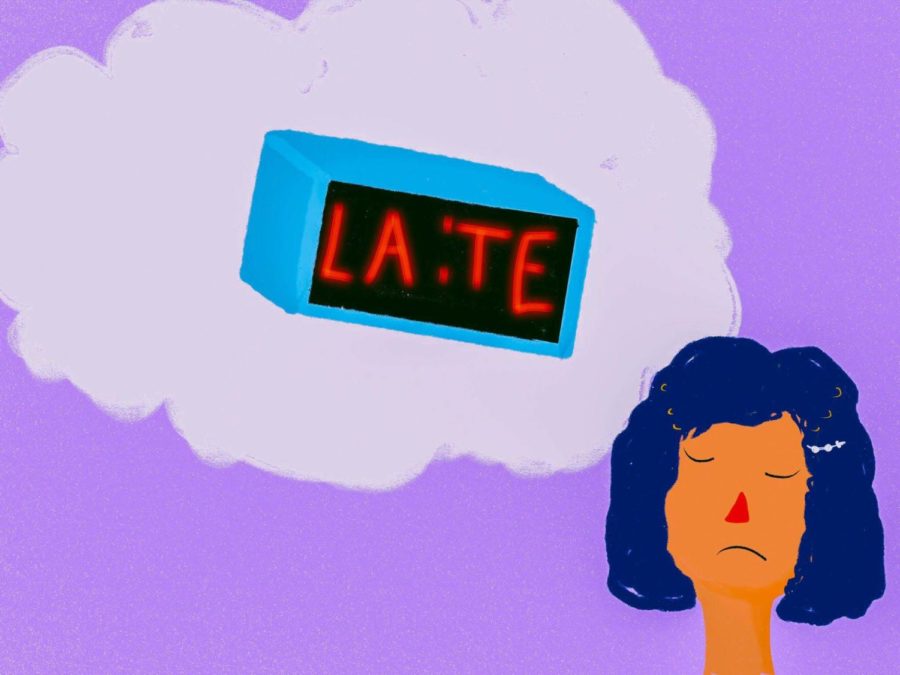Stress dreams are made of finals
December 9, 2019
This week, no students in Oakland are dreaming of sugarplums. Instead, their nights are full of visions of forgotten exams, maze-like academic buildings and unlocatable classrooms in what feels like one long “Nightmare Before Christmas.”
University-related dreams are common amongst students. A 2017 study by career website Debut found that 84% of college students surveyed reported having nightmares about school, half of which were recurring. These nightmares most commonly pertained to taking exams, followed by failing those exams or their classes altogether.
Emma Krofcheck, a sophomore double majoring in physics and astronomy, has particularly unsettling dreams during finals season. She said over Thanksgiving break, she dreamt she was forced to go to a class even though, in her dream, the professor had passed away.
“I had a dream that my professor died,” she said. “They sent out a call to all of us about it, but then said that we would have to finish out the semester with a different professor.”
In another dream, Krofcheck found herself in elementary school, except she was still subjected to the stresses of college. She said this dream in particular felt long and vivid.
“I was back in my elementary school, but it was still like college,” she said. “I was enrolled in a whole bunch of classes that I had never gone to, and it was finals week, and I was gonna fail all my finals because I didn’t go to any of my classes.”
In order to understand the meaning of their dreams, some people will turn to people who claim to have the ability to interpret dreams, such as psychic mediums, for an explanation. Sara Sachs, a Pittsburgh-based psychic medium who operates a storefront in Wilkinsburg, said the stress of finals season may bring up unresolved issues, whether related to the death of loved ones or traumatic moments from childhood. She said she thought that Krofcheck’s dream about her professor’s death may have been provoked by unaddressed feelings of grief surrounding the loss of a mentor figure.
“I really feel as though it could be someone from the other side trying to maybe reassure her a little bit, that you really have to go on, you really have to take that test,” Sachs said. “It almost feels like it could be someone that she lost that could have been a parental type of figure, that was maybe very intelligent, that was maybe a little professorial.”
Similarly, Sachs said Krofcheck’s dream about being in elementary school could be a manifestation of unresolved childhood feelings of inadequacy, likely originating from the criticisms of an authority figure.
“That [stressful] part of her childhood, that’s the real interesting thing that may be giving her the anxiety about the tests now,” she said. “There’s something very important about those primary school years that would bring her the stress to take her back to those times.”
Krofcheck said she didn’t think any lost loved ones were trying to reach out to her through her dreams, although she did see validity in Sach’s assertion that her elementary school dream was caused by unpleasant childhood experiences. She found another explanation, offered by Brant Hasler, an associate professor in the psychiatry department and a faculty member with the Center for Sleep and Circadian Science, much more likely.
Hasler said that psychologists have found that our brains process and store our memories while we sleep in a stage called rapid eye movement sleep. Because dreaming occurs during REM sleep, the memories we process when we sleep may influence the content of our dreams — which explains why students dream about school during exam season.
“Given that we know that this memory consolidation is happening during this time, it’s reasonable to think that dreams are an offshoot of that … what we’re dreaming about has to do to some degree with the memories that we’re consolidating,” Hasler said.
He also said the dreams students have during finals season may seem particularly vivid because their waking memories from the day are both particularly emotional and particularly important during exam season.
“If they’re stressed during finals season, if they’re experiencing more of these emotional things during the day, especially around things that they’re studying,” he said, “then that makes it more likely that it’s going to be something that their brain is gonna try to remember especially during REM sleep.”
Dreams, however, don’t directly copy our daily memories. Often, they include seemingly random, unconnected moments from the past, like when Krofcheck dreamt about her elementary school days. Hasler said that the appearance of distant memories are another part of the memory consolidation process. In order to store new memories, our brain connects them to elements from our past.
“Our brain is trying to make sense of [a memory], put it into our brain to keep for a longer amount of time, and then as part of that process it may be linking it to things that happened in the past as well,” he said.
So why do students have such vivid dreams during finals season? Hasler said the answer lies in the fact that they’re experiencing heightened emotional states while studying, a function which requires the brain to work overtime in terms of memory consolidation.
“If [students are] stressed during finals season … especially around things that they’re studying,” he said, “then that makes it more likely that it’s going to be something that their brain is going to try to remember … during REM sleep.”
Sachs agreed that odd dreams help people come to terms with stress, but also said she sees them as an outlet for subconsciously discovering more about themselves.
“It’s really interesting what stress does, because sometimes in dreams, that can be a way of dealing with it, but also to see what it reveals about you not only in where your growth is, but in where your spirituality is as well,” she said.








